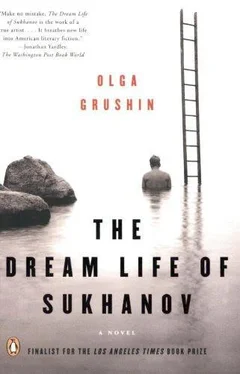Over the next two years, the date of my father’s release from the unspecified hospital kept being postponed, although, according to my mother, he was always close to getting well. He wrote to us regularly, of course, but all his letters were lost in the mail. Shortly after the beginning of the war, we left Moscow without having heard from him, joining thousands of people in a worried exodus to the east.
Then, sometime in the spring of 1942, I learned that he had been cured at last and was returning home, to work at an important defense facility in the vicinity of Moscow. A trickle of letters started between us, unpredictable and accidental like all wartime correspondence, but real, oh so real after the desperate years of silence. My mother read each precious missive aloud, clutching it tightly as if doubting its existence, and pausing often, sometimes visibly skipping a line or two with her startled, red-rimmed eyes. The letters released in me a warm burst of new hope. I knew that, after all this time, our meeting was drawing near, and, inspired by my recently discovered gift, I spent hours trying to render, on scraps of rough brown paper, margins of newspapers, discarded envelopes, and whatever else drifted into my life, everything I could remember of his laughter, his gestures, his walk, the way he squared his chin when he listened, the way my heart felt solid and warm and in place when his big hands rested on my shoulders…. We received his last letter in October of 1943, just as we began to prepare for our own return home. He knew we were coming. He wrote that he had a wonderful surprise planned for us—he had finally made the great discovery of his life. My mother looked queasy.
The city was slick with sleet and rain when, at two in the afternoon on the sixteenth of November, we disembarked from the overcrowded train and made our halting way across the platform. The night before, while we had waited for hours at some nameless, unlit station, I had traced my father’s name in the grime of our car’s window, but in the morning someone had slid the window open, and as the rain lashed inside, the letters ran down in dirty rivulets, growing slowly unrecognizable.
He himself was not there to meet us.
“That’s fine, that’s fine, we’ll manage, that’s fine,” my mother kept saying in a small, fluttering voice I did not like. We had few belongings: a bag stuffed with clothes, another full of kitchen utensils, a bulky lampshade she had refused to leave behind, and a folder bulging with my drawings and watercolors, my most—my only—cherished possession, which I carried under my coat, pressed to my chest, imagining all through our journey how I would spread them out on the table before my father’s eyes and wordlessly, my heart skipping with fear and joy, await his judgment. The city unwound before me like a tormentingly sluggish movie reel that seemed never to end. Then somehow it did—and there we were already, walking on our familiar Arbat street, slipping on the glistening pavement under the weight of our bags.
The deserted street is so quiet I can almost hear the liquid echo of our slushing steps. Most of the windows in the houses around us are dark, some even boarded—but I can already see that in the building ahead of us, our building, the windows on the fifth floor, our floor, are lit, lit brightly, lit bravely, overflowing with a nearing, already tangible happiness—and… Is it truly possible? Yes, a tall, broad-shouldered man is silhouetted against one of the windows, and as we draw closer, so close that I have to tilt my head back until my neck hurts, I see that it’s him, it’s really him, he is standing there waiting for us, and he is smiling, and the whole thing seems so much like a recurring dream I have had for years that I am a bit afraid to wake up. And just as I think that, the man in the window, my father, raises his hand in greeting to us, and then pushes the rain-sleeked window frame outward and, with a quick movement, steps on the windowsill; and for one brief moment, ignoring my mother’s soft, horrified gasp behind me, I frenziedly try to guess the words that he is about to shout to us—the first live words I will hear from him in years.
But my father does not shout. In the next instant, still smiling joyfully, he takes a step forward, and walks off the windowsill—walks off into nothing at all.
A heartbeat wells in me, large and hollow and deafening, like the rushing sound of a monstrous waterfall, and all I know, all I believe, all I love, hangs in a confused, incredulous balance. Then, emitting a kind of strained moan, my mother grabs my head and roughly pushes my face into her coat, painfully pressing my cheek into a button, and, suddenly enveloped in her woolly darkness, I close my eyes and inhale the sharp smell of damp cloth and the faint smells of stale smoke and dried meat—the manifold odors of the rain falling on the hateful city and of our last night’s train to nowhere. And as I stand without moving, it seems without breathing, my feeling of living in the present tense, my perception of reality, the very memory of my identity leave me like crumbling shells of things that have died, and the world itself falls away from my senses.
After that, the rain began to turn to snow, prickling the exposed skin of Anatoly’s neck and hands like tiny cold needles, and there were people running from somewhere and shouting, and then he was suddenly running himself, faster and faster, hugging his folder of drawings with both arms, and there were darkening streets swerving before him, and an old woman who exclaimed with fright on some corner and then cursed angrily at his back, and a mangy dog that followed him for a while whimpering lightly, and after that, some quiet yard with water dripping dully, incessantly, from the branches of naked trees and all the cornices and all the windowsills—and again, the world gently slipped away like a child’s clumsily folded paper boat being swept away by the current….
It was in that yard, hours later, that Sashka Morozov found him, sitting motionless on the ground, watching bits and pieces of torn paper as they drowned in the downpour. Talking loudly all the while, Sashka held him firmly around the shoulders and led him somewhere, and there were more people, some of whom he probably knew, and others whom he did not, and that night they put him and his mother into a car and drove them across the river, to some place with a multitude of tiny rooms opening into one another like a series of mousetraps. He remembered oppressively low ceilings, ugly wallpaper in brown and red zigzags in the hallway, and a giant rusty bathtub resting on funny-looking clawlike feet. A skinny woman with a sharp nose kept fussing over him in visible embarrassment, pressing a cup of lukewarm soup on him and calling him “poor dear”; and a serious yellow-haired boy, no more than ten years old, surreptitiously followed him with curious, shining eyes wherever he went, whatever he did, as if expecting him to change into something strange at any moment.
Anatoly gave the boy his few remaining drawings to play with; he did not want them any longer. They must have stayed with these nameless, unnecessary people for some time, a few days at least, perhaps a whole week, because he was still there when the tenacious, numbing grief, which had paralyzed his being for so long he had ceased to understand time, began to release him slowly, breath by breath, until one evening he was finally able to sit, dry-eyed and oddly unfeeling, repeating, “There, there,” while his mother cried with relieved abandon on his shoulder. That night they moved across snow-buried Moscow back to the Arbat apartment.
He never did find the surprise his father had prepared for them. There was no trace of any important discovery among the man’s scanty possessions. His desk contained a neat stack of engineering manuals, a framed photograph of Nadezhda Sukhanova as a very young, touchingly awkward girl, and a volume of Pushkin’s works bookmarked in a few places, with two impatient exclamation points in red pencil in the margins next to the sentence “A scientist without talent is akin to that poor mullah who cut up the Koran and ate it, thinking thus to be filled with the spirit of Mohammed.” There was also a picture, torn out of some children’s magazine and thumbtacked to the wall, of a brightly colored—crimson, white, and golden—hot-air balloon, one of the early models, across which Pavel Sukhanov had written in his slanting, confident handwriting: “Don’t let anyone clip your wings.”
Читать дальше








![Theresa Cheung - The Dream Dictionary from A to Z [Revised edition] - The Ultimate A–Z to Interpret the Secrets of Your Dreams](/books/692092/theresa-cheung-the-dream-dictionary-from-a-to-z-r-thumb.webp)



